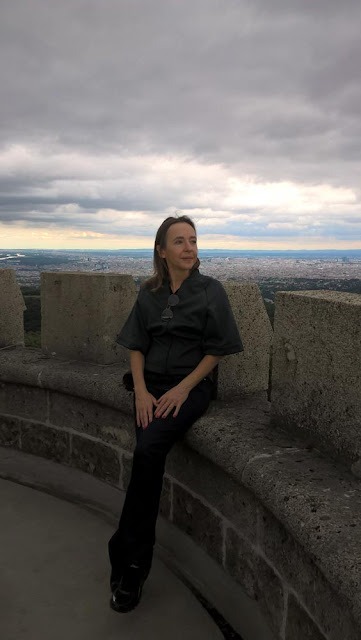The Fight for the Castle
 |
| fig.: The image shows me sitting at the tower of Habsburgwarte at the Hermannskogel with view over Vienna. |
Currently, the rally for getting the people's votes at the legislative election on 15 October is in full speed. The political parties cook their own soups in different styles; the ones more stylish, the others more foul-mouthed. There is no difference between right or left when it comes to strong words and messages in the tradition of aggressive 'battle-cries' just as if the mission is to take the castle. And truly, it's literally the mission of the political parties to get the most votes at the legislative election to occupy the Hofburg, the former seat of the Habsburg monarchy where today Austria's chancellor resides. The chancellor is the country's most important political position. In Austria, the president has in contrary to the US - only for example, less political influence. Perhaps some are now interested in the Austrian system? Well, the chancellor is the position which links together - in collaboration with the vice chancellor - the various ministries; last mentioned vice chancellor is usually called by another party for keeping the power inside the state balanced. Sometimes, the power-balance order can prevent that the parties work successfully. This was the reason why the Austrians have to vote sooner than expected. The tax payers know that the team leaders of the ministries, the state's government couldn't work together. But do the tax payers know what the team has accomplished until yet and what they've never started to resolve?
The finished work is part of the political parties' campaigns. In times of legislative election campaigning, the Austrians receive daily the summaries of successful contracts, new laws and budget strategies of the last years. But what isn't mentioned by the political parties? And why are experts from special fields such as media or art so quiet? What are the themes the tax payer doesn't know about? Is it that topics like digital business or copyright are too intellectual for the uneducated average citizen?
But it's this uneducated everyman or everywoman who pays for example for artist exhibitions at La Biennale di Venezia. And the men and women don't pay little! The average citizen trusts the system to invest wisely into art - and even when this sounds now profane for some well-paid artists: the people trust that their money will maximize the state's budget through the art business for further investments such as into earthly necessities like children's education or health services.
So far it's easy to understand and now we are reaching the expert level which is in several fields a spooky quiet location in Austria such as the art, media, copyright field. Artists are supported by the tax payers as their art is seen as an investment. These paid artists distribute images of their works for public relations to journalists; but the images are carrying secretly a fee for the representation of the artists' works. Journalists can write about the work, but they can't show them without paying the fee. Isn't it perfidious to send somebody a picture for editorial use without a note that it must be paid for it? No, it's not a perfidy for some Austrian artists. It's common and legal; this is what the uneducated average Austrian pays for without knowing which art-media soup is cooked at his or her own democratically ruled castle.
Some of the questions for opening political parties the doors of the Hofburg should be: Who has really worked for transparent rules? Who supported during the last years in-transparent rules for the ones who work and live in Austria? And why are so many experts anxious to speak about legalized irregularities in their fields such as art or media?
And one question for the very specialized media experts: Is there a correlation between the above mentioned copyright law and power exercises in the Austrian media landscape? Could it be the case that the copyright law might be under circumstances part of the fight for the castle?


